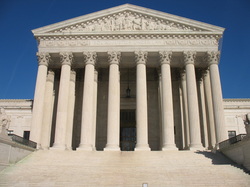
In the recent Supreme Court ruling on gay marriage reversing the Defense of Marriage Act, dissenting judge Antonin Scalia offered the longest opinion as to why this was a misguided and ominous ruling.
Some on the left have tried to present Scalia as a nut case. They talk of his "intemperate dissent." It was passionate, I'll grant you that--all 26 pages of it.
He criticizes the verdict as judicial overreach. But most interesting is his statement that Justice Kennedy and his colleagues in the majority have essentially resorted to calling opponents of gay marriage (i.e. those who defend traditional marriage) "enemies of the human race." Scalia does so on the grounds that the ruling itself uses intemperate language, saying those who support DOMA and traditional marriage "disparage," "injure," "degrade," "demean," those who are homosexual. "All that," wrote Scalia, "simply for supporting an Act that did no more than codify an aspect of marriage that had been unquestioned in our society for most of its existence--indeed, had been unquestioned in virtually all societies for virtually all of human history."
Some on the left have tried to present Scalia as a nut case. They talk of his "intemperate dissent." It was passionate, I'll grant you that--all 26 pages of it.
He criticizes the verdict as judicial overreach. But most interesting is his statement that Justice Kennedy and his colleagues in the majority have essentially resorted to calling opponents of gay marriage (i.e. those who defend traditional marriage) "enemies of the human race." Scalia does so on the grounds that the ruling itself uses intemperate language, saying those who support DOMA and traditional marriage "disparage," "injure," "degrade," "demean," those who are homosexual. "All that," wrote Scalia, "simply for supporting an Act that did no more than codify an aspect of marriage that had been unquestioned in our society for most of its existence--indeed, had been unquestioned in virtually all societies for virtually all of human history."
Scalia's statements are striking and not overstated. Because since 2010 the Department of Justice (DOJ) has argued that acting to protect traditional morality shows hostility to gays and lesbians as a class. In other words, to the DOJ, and now to the Supreme Court, traditional notions of morality are themselves hostile. So, by implication, Christian morality is not just discriminatory, it is hostile.
Most people do not seem to realize where this little phrase "enemies of the human race" comes from. It was used by Tacitus, the first century historian of the Roman empire. It was used to describe the Neronian persecution against early Christians. Nero accused, arrested and tortured many. He used them as scapegoats for his own troubles. One of his accusations was that Christians hate the human race. Tacitus goes on to say that as a result—Nero mocked them, covered them with skins of beasts, had them torn apart by dogs, nailed to crosses, or tied to posts and burnt as living torches for a spectacle in his garden parties.
All this because Christians believed in Christ crucified and did not find the self- indulgent life style of many Romans acceptable (including the homosexual life style).
The use of this phrase "enemies of the human race" by justice Scalia serves as a warning for what may be ahead. Not that Washington is about to burn Christians. But some are putting us in the same category as anti-Semites and the KKK because of our objection to gay marriage.
Scalia's words are a warning that a season of church-state conflict lies ahead—that litigators will start suing groups that are "discriminatory," and that there will be more ostracism of Christians in the public leadership. He also said that the ruling is a sign that the majority on the Supreme Court is now ready to declare gay marriage a constitutional right.
What is particularly striking about the timing of this ruling is that it takes place on the 1700th anniversary of Emperor Constantine's Edict of Milan (313 A.D.). That famous edict reversed a 200 year old policy of the Roman Empire against Christians which led to discrimination and persecution. The Edict of Milan decreed that freedom of religion is inherent to each human person. It announced that "all who choose a religion are to be permitted to continue therein, without any hindrance, and are not to be in anyway troubled or molested."
The Western world is not interested in celebrating Milan. Instead it is going backwards. It is embarrassed by Christianity. It refuses to even recognize the contribution Christianity made in shaping our culture. It casually defies the laws of God. It reduces the freedom of religion. And it forgets that all civilizations rise and fall and will be judged by the Supreme Judge of all the earth.
It was the early African Christian apologist Tertullian (160 c-225) who wrote to his pagan accusers, "You choose to call us enemies of the human race, rather than of human error." But then he added, "to tell the truth, we are enemies, not of the human race, but of human error."
In light of history, Scalia's words were no rant, but an insightful observation of the immense clash of vision that this ruling represents. He is historically informed enough to know what has happened before and where we may be headed.
Most people do not seem to realize where this little phrase "enemies of the human race" comes from. It was used by Tacitus, the first century historian of the Roman empire. It was used to describe the Neronian persecution against early Christians. Nero accused, arrested and tortured many. He used them as scapegoats for his own troubles. One of his accusations was that Christians hate the human race. Tacitus goes on to say that as a result—Nero mocked them, covered them with skins of beasts, had them torn apart by dogs, nailed to crosses, or tied to posts and burnt as living torches for a spectacle in his garden parties.
All this because Christians believed in Christ crucified and did not find the self- indulgent life style of many Romans acceptable (including the homosexual life style).
The use of this phrase "enemies of the human race" by justice Scalia serves as a warning for what may be ahead. Not that Washington is about to burn Christians. But some are putting us in the same category as anti-Semites and the KKK because of our objection to gay marriage.
Scalia's words are a warning that a season of church-state conflict lies ahead—that litigators will start suing groups that are "discriminatory," and that there will be more ostracism of Christians in the public leadership. He also said that the ruling is a sign that the majority on the Supreme Court is now ready to declare gay marriage a constitutional right.
What is particularly striking about the timing of this ruling is that it takes place on the 1700th anniversary of Emperor Constantine's Edict of Milan (313 A.D.). That famous edict reversed a 200 year old policy of the Roman Empire against Christians which led to discrimination and persecution. The Edict of Milan decreed that freedom of religion is inherent to each human person. It announced that "all who choose a religion are to be permitted to continue therein, without any hindrance, and are not to be in anyway troubled or molested."
The Western world is not interested in celebrating Milan. Instead it is going backwards. It is embarrassed by Christianity. It refuses to even recognize the contribution Christianity made in shaping our culture. It casually defies the laws of God. It reduces the freedom of religion. And it forgets that all civilizations rise and fall and will be judged by the Supreme Judge of all the earth.
It was the early African Christian apologist Tertullian (160 c-225) who wrote to his pagan accusers, "You choose to call us enemies of the human race, rather than of human error." But then he added, "to tell the truth, we are enemies, not of the human race, but of human error."
In light of history, Scalia's words were no rant, but an insightful observation of the immense clash of vision that this ruling represents. He is historically informed enough to know what has happened before and where we may be headed.


 RSS Feed
RSS Feed